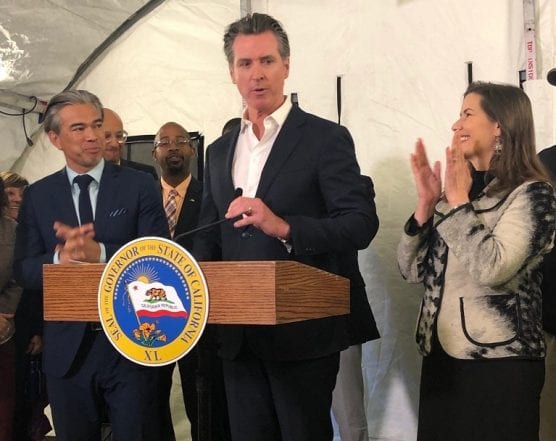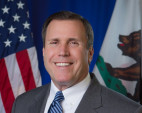OAKLAND – Wrapping up a weeklong “homelessness tour” in Oakland Thursday, California Governor Gavin Newsom unveiled a package of new state resources being deployed to help cities and counties tackle the state’s most vexing and visible social problem.
“The issue of homelessness is a crisis in the state of California,” Newsom said. “None of us are stepping aside and waiting for someone else to solve this.”
Newsom delivered his homelessness tour remarks inside one of the modular tents to be distributed across the state. The tents will provide temporary shelter and serve as triage centers to connect unsheltered residents with health care and social services.
The governor announced $650 million in emergency grants that will be doled out to cities and counties across the state over the next few weeks, along with 100 former FEMA trailers to serve as temporary shelters.
Of that $650 million, $38 million will go to Alameda County, including $19.7 million that will be made “available today immediately” for the city of Oakland to invest in rapid rehousing, recuperative care, rent money assistance, converting hotels and motels into permanent supportive housing, and gap financing for Section 8 housing vouchers.
Oakland also received 15 camp trailers from the state, equipped with working bathrooms, sinks, water hookups, and furnished with built-in couches and beds. Those trailers were on display in a vacant parking lot next to the Oakland Coliseum where the governor delivered his homelessness tour remarks Thursday.
Oakland Mayor Libby Schaaf said her city was “first in line” to request trailers from the state. Six of the trailers will be used to the house homeless youth in Oakland. Nine others will house homeless families in East Oakland, Schaaf said.
Though thankful for the state support, Schaaf stressed that temporary shelter will not provide a lasting solution to the homeless crisis. That is why she and other members of governor’s council of regional homeless advisers have recommended a state constitutional amendment that would create a legally enforceable mandate to end homelessness. The proposal, which would require approval by the Legislature and then voters, would make local governments that fail to shelter their residents vulnerable to lawsuits.
“The first step of that is for us to be held accountable to the people of California that we are doing everything we can with the resources and regulatory powers that we have to put an end to this travesty of homelessness,” Schaaf said.
On top of the $650 million in emergency grants to be distributed over the next few weeks, Newsom has also proposed allocating $1 billion for homelessness in the 2020-21 state budget, including $750 million for a new California Access to Housing and Services Fund.
The fund would be administered by the state Department of Social Services and dole out grants for rental assistance, creating more housing and preserve existing housing.
The governor has also proposed $695 million in next year’s budget, to be increased to $1.4 billion by 2022, to reform the state’s Medi-Cal system to provide better preventative care and expand treatment for mental illness and substance abuse.
The state has also identified 1,330 “excess properties” that could serve as temporary shelters or permanent supportive housing. Newsom said the state will soon turn over 100 properties to local governments with plans to fast-track the construction of housing facilities.
Acknowledging these proposals alone will not solve the state’s vexing homelessness crisis, Newsom called attention to other steps recently taken by the state to help prevent people from losing housing.
Last year, Gov. Newsom signed Assembly Bill 1482. The measure, which took effect Jan. 1, caps rent hikes at 5%, plus inflation, and requires landlords have “just cause” to evict tenants.
Newsom’s appearance in Oakland ends a weeklong tour that included visits to Grass Valley, Fresno, Riverside and Los Angeles.
The governor said for too long the state stood back and expected local governments to address homelessness with little to no support from the state. He said California is now committed to working with cities and counties to help end the crisis, but local governments will remain independent in deciding how best to use the state’s resources.
“We’re building on what’s working,” Newsom said. “We’re not trying to disrupt a local framework of accountability but to help amplify that accountability and provide more support and more transparency focused on results.”
Like this:
Like Loading...
Related





 Tweet This
Tweet This Facebook
Facebook Digg This
Digg This Bookmark
Bookmark Stumble
Stumble RSS
RSS


























REAL NAMES ONLY: All posters must use their real individual or business name. This applies equally to Twitter account holders who use a nickname.
0 Comments
You can be the first one to leave a comment.